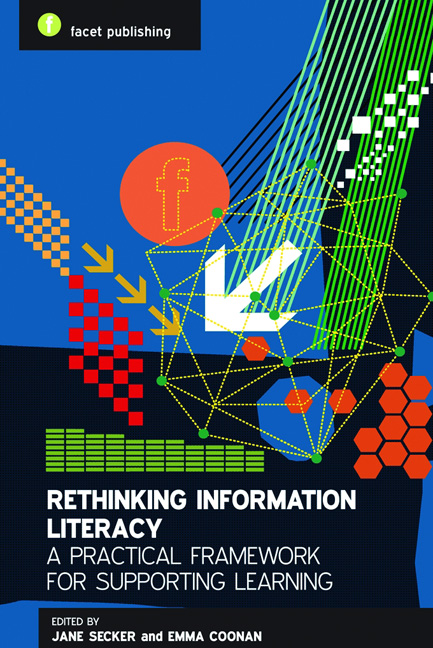Book contents
- Frontmatter
- Contents
- Acknowledgements
- Contributor profiles
- Introduction
- Strand One Transition from school to higher education
- Strand Two Becoming an independent learner
- Strand Three Developing academic literacies
- Strand Four Mapping and evaluating the information landscape
- Strand Five Resource discovery in your discipline
- Strand Six Managing information
- Strand Seven The ethical dimension of information
- Strand Eight Presenting and communicating knowledge
- Strand Nine Synthesizing information and creating new knowledge
- Strand Ten The social dimension of information
- Afterword: ‘Ownership is a flawed concept’
- Conclusion
- Appendix 1 A New Curriculum for Information Literacy (ANCIL): the curriculum
- Appendix 2 ANCIL Lesson Plan
- Appendix 3 ANCIL Institutional Audit: worksheet
- Appendix 4 ANCIL Institutional Audit: interview questions
- Index
- Miscellaneous Endmatter
- Miscellaneous Endmatter
- Miscellaneous Endmatter
- Miscellaneous Endmatter
Appendix 4 - ANCIL Institutional Audit: interview questions
Published online by Cambridge University Press: 08 June 2018
- Frontmatter
- Contents
- Acknowledgements
- Contributor profiles
- Introduction
- Strand One Transition from school to higher education
- Strand Two Becoming an independent learner
- Strand Three Developing academic literacies
- Strand Four Mapping and evaluating the information landscape
- Strand Five Resource discovery in your discipline
- Strand Six Managing information
- Strand Seven The ethical dimension of information
- Strand Eight Presenting and communicating knowledge
- Strand Nine Synthesizing information and creating new knowledge
- Strand Ten The social dimension of information
- Afterword: ‘Ownership is a flawed concept’
- Conclusion
- Appendix 1 A New Curriculum for Information Literacy (ANCIL): the curriculum
- Appendix 2 ANCIL Lesson Plan
- Appendix 3 ANCIL Institutional Audit: worksheet
- Appendix 4 ANCIL Institutional Audit: interview questions
- Index
- Miscellaneous Endmatter
- Miscellaneous Endmatter
- Miscellaneous Endmatter
- Miscellaneous Endmatter
Summary
These questions were used in the pilot audit undertaken at York St John University and University of Worcester. They may be used in interviews (this is the recommended data collection method), and may also be adapted for use as a questionnaire.
1. What is your job title?
2. How would you summarise your role?
3. Do you support students?
4. At which point(s) do you support them?
1 Throughout their time in higher education
2 At transition
3 At first year
4 At second year
5 At third year
6 At postgraduate level
7 At leaving
5. These are the strands of the new curriculum. Does your role involve delivering provision or supporting students formally within any of them at the moment?
1 Transition to higher education
2 Becoming an independent learner
3 Developing academic literacies
4 Mapping and evaluating the information landscape
5 Resource discovery in a set discipline
6 Managing information
7 Ethical dimension of information
8 Presenting and communicating information
9 Synthesising information and creating new knowledge
10 Social dimension of information
6. Where ‘formally’ means timetabled sessions that students have to attend, and ‘informally’ means non-compulsory sessions, online materials or other support, do you formally or informally:
1 Help students produce work at HE level
2 Help students differentiate between a popular and an academic resource
3 Help students find their academic voice
4 Help students work out how to find resources and understand the process
5 Help students think about how they research and why
6 Help students identify how they learn and what strategies they can use
7 Help students deal with negative learning experiences
8 Help students identify support available
9 Help students learn to influence through use of language
10 Help students understand how they are influenced
11 Help students develop reading techniques like skimming
12 Help students learn they can find relevant information in a resource that isn't apparently about their topic
13 Help students develop evaluation skills
14 Help students learn who their subject experts are and why
15 Help students muster their argument with supporting evidence
16 Help students know what the best tools are for them to use
- Type
- Chapter
- Information
- Rethinking Information LiteracyA practical framework for supporting learning, pp. 161 - 164Publisher: FacetPrint publication year: 2012



